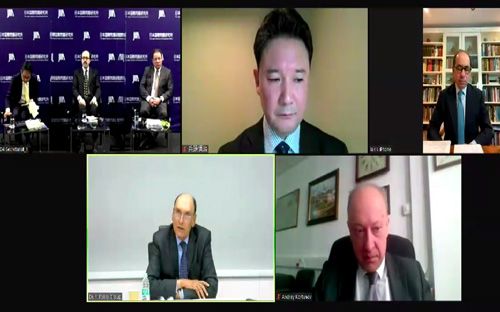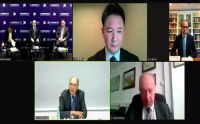JIIA’s 4th Tokyo Global Dialogue
Date:
February 21, 2023
The 4th Tokyo Global Dialogue
February 20-21, 2023
“The End of the ‘post-Cold War’ Era and the Future of the US-led International Order”
February 21, 2023
Session on “Impact of the War in Ukraine- Politics and Security”
Address by Amb. H. K. Singh, Director General
- Professor Ken Endo and my fellow panellists, greetings from Delhi. I am Hemant Singh at the Delhi Policy Group.
- We are meeting as the Ukraine conflict enters its second year, and I realise that I am the only speaker from an emerging Asian power. The perspective which I will share is personal, and the reality I see is more complex and nuanced than the background for this session suggests.
Global Order
- Let me start with a couple of observations on the Global Order.
- Great power competition remains the mainstay of global geopolitics. What is different today is that the world’s great powers have shed most constraints to their behaviour as they engage in military aggression and economic coercion to establish regional primacy and global dominance. The burden of this contest is being borne mainly by developing countries, whose interests stand marginalised.
- The current and overwhelming US focus on Russia is taking its attention away from what is essentially in the long term going to be a US-China contest for global primacy and influence.
The War in Ukraine
- Now, let me turn to the Ukraine War.
- There is no question that Russia dealt a harsh blow to world order with its premeditated and increasingly brutal military aggression against Ukraine. This will greatly diminish its power, influence and global standing.
- But this invasion was neither sudden nor unheralded.
- As an event, it emanated on the one hand from major Russian miscalculations, including perceptions of US weakness and Western disunity; and on the other, the failure of preventive diplomacy and the breakdown of conventional deterrence in Europe.
- More importantly, the invasion did not overturn any established order. Structural issues over the post-Cold War security order in Europe, and ambivalence about Russia’s role and standing in Europe, have prevailed since 1991 and have never been settled.
- So this is also a crisis that has been waiting to happen. Europe has a historical tendency to generate major wars, and conflicts of ethnicity and religion are not new to it. The not-so-distant precedent for change of territorial status quo by military force already exists in Europe.
- Ukraine has every right to defend its territorial integrity and sovereignty. But what started out as a localised conflict between neighbours has escalated into a major war involving the US, NATO and the EU in an all-out confrontation with Russia, using Ukraine as the proxy and sword arm.
- This has become a civilisational war for domination over the European security order.
- The US has rallied its European allies, but is increasingly entrapped by their demands for escalation in pursuit of a decisive military victory, which is unlikely without the direct involvement of NATO. Incrementally, NATO is replacing Ukraine as Russia’s main battlefield adversary. This can lead to unmanageable escalation and a strategic deterrence breakdown.
- There is good reason for the world to be seriously concerned about that prospect, especially as implausible scenarios of total victory are being contemplated.
- Russia is a far weaker major power than the US-NATO combine, but it has considerable autonomous resources and capabilities. It can withstand prolonged conflict. Expectations of its imminent collapse are unrealistic.
- Crimea is Russia’s strategic jugular, providing warm water access and trade links across the crossroads of Eurasia. Its loss will be deemed as a catastrophe by anyone in power in Moscow.
Prospects for the Conflict
- So, what are the prospects for the conflict?
- Whatever the outcome, the resolution of Europe’s historical antagonisms will become more difficult for decades to come, and instability will persist.
- The West’s manifest intent to crush Russia militarily and economically has already become an existential threat for Moscow.
- Whether it is a prolonged war of attrition or a frozen conflict, the US will need to divert more resources to Europe – creating a persistent threat to its security interests on both European and Asian fronts.
- And the longer the war lasts, NATO’s cumulative power will be progressively drained, with serious consequences for the US and Europe.
- The US lacks the capability to constrain both China and Russia at the same time; its power and influence is increasingly dependent on the contributions of its allies. If the US-led alliance system is militarily and economically under stress, there will be adverse repercussions for stability in the Indo-Pacific.
- Furthermore, an over-extended Euro-Atlantic alliance and a battered Russia will provide strategic space to China, which has already been taking advantage of the European preoccupations of the US by flexing its muscles, from the Himalayas to East Asia. Risks to the security of Japan and India will grow.
- There is a critical difference between Europe and the Indo Pacific. In Europe, the US can be an offshore leader leveraging the strength of its NATO allies. In Asia, if there is a conflict, the US will face its adversaries directly, with limited contributions from its regional allies. It will have to lead from the front.
- The future of world order, in my view, will be decided in Asia and the Indo-Pacific, not in Europe.
Divided Global Response
- I will turn now to the divided global response.
- The majority of the world’s nations, comprising emerging powers and the Global South, are not taking sides between the West and Russia. The question is why.
- Well, a unified global response is possible only when the wider international community is being consulted and its perspectives and interests are being taken into account.
- The West is caught in a spiral of self-serving actions. Its unilateral coercive measures have disrupted the global economic order, with devastating consequences for developing countries.
- Rules-based order, particularly respect for territorial integrity and sovereignty, tends to be invoked mainly when the interests of the West are involved.
- Among the emerging nations of Asia, a self-absorbed Europe is seen as far removed from issues of stability and strategic balance in Asia. There is deep scepticism about expanding the remit of NATO to Asia, not least after the Afghanistan debacle. And there is growing concern about the West’s security and economic policy coordination through NATO and the G7, bypassing the larger comity of nations.
- Alienation of the “Rest” is growing as already weak global institutions are side-lined, or seen to serve mainly Western interests.
India’s Position
- Finally, a word about India’s position.
- India has consistently called for, and will continue to call for, an end to the Ukraine war and resort to dialogue and diplomacy as the best way forward to peace. It will put its weight behind a ceasefire and negotiated resolution of the conflict.
- India’s primary concern is with authoritarian expansionism and coercion in Asia. Enhancing capacity to deter aggression, aligning threat mitigation strategies with Quad partners, and jointly contributing to a free and open Indo-Pacific remains India’s foremost priority.
- As the Chair of the G20 this year, India’s main focus will be on the interests of the Global South. India will contribute constructively to a more inclusive and equitable distribution of global resources, finance and technology.
Preparing for Peace/Conclusions
- The Ukraine conflict is fundamentally a war within the European civilisation. Its origins lie in Europe. So do the solutions. Both sides need to introspect on their respective roles in bringing developments to their current pass.
- With the protagonists seeking decisive battlefield gains, it remains far from clear when negotiations on the possible terms of a settlement can begin. Meanwhile, the human and economic costs are rising. It is time for Europe to seriously reflect on the costs of “total” victory, as also its embittered aftermath.
- Russia can be diminished but not erased. A fractured world order is becoming increasingly likely. A great deal will depend on the manner in which the Ukraine conflict is brought to an end.
Please follow the link.
***




